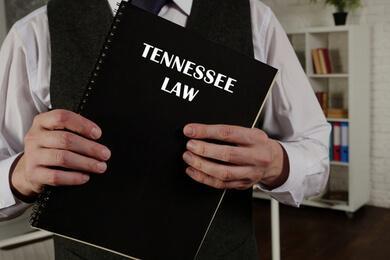Recent Blog Posts
New Tennessee Criminal Laws That Took Effect July 1
 January 1 and July 1 are traditionally the dates that new laws go into effect in Tennessee and this year is no different. Tennessee lawmakers have been busy passing a wide array of new bills, many of them aimed at the criminal justice system. The following are some of the changes that everyone should be aware of, especially since they could affect what type of criminal charge and penalties an individual may be facing.
January 1 and July 1 are traditionally the dates that new laws go into effect in Tennessee and this year is no different. Tennessee lawmakers have been busy passing a wide array of new bills, many of them aimed at the criminal justice system. The following are some of the changes that everyone should be aware of, especially since they could affect what type of criminal charge and penalties an individual may be facing.
Constitutional Carry Law
One of the major changes is in Tennessee’s Constitutional Carry law. The new law means that residents who are 21 years of age or older will no longer have to apply for a permit or take safety courses in order to carry a handgun. The penalty for stealing a gun is harsher, however, since the crime will now be charged as a Class E felony. More details about this law can be found in a prior post our firm published, “Tennessee Passes New Permitless Gun Law.”
Knoxville Officials Looking for Ways to Curb Juvenile Violence This Summer
 Gun violence has reached epidemic proportions around the country. Tragically, Knoxville has not been spared. So far this year, 22 victims have been shot to death. According to information released by the Knoxville Police Department, five of the victims were teenagers and, just as alarming, three of those accused of committing the murders are also teens.
Gun violence has reached epidemic proportions around the country. Tragically, Knoxville has not been spared. So far this year, 22 victims have been shot to death. According to information released by the Knoxville Police Department, five of the victims were teenagers and, just as alarming, three of those accused of committing the murders are also teens.
Knoxville Community Involvement
Now that summer is here, the concern is that the violence will escalate since teens are out of school and have more time on their hands. This has led Knoxville officials to look for different ways to help minimize the violence and keep teens off the streets and out of trouble.
The city has partnered with 13 different community groups to employ teens from 12 to 21 years of age who have been identified as high risk for either perpetrating a violent crime or being a victim of one. High-risk youth are referred to as “opportunity youth.” Knoxville officials have awarded grants of between $3,000 to $20,000 to organizations that have developed programs that will introduce mentors to teens, teach them job skills, and provide activities that will keep them occupied.
Tennessee’s Death By Distribution Law Can Mean a Second-Degree Murder Conviction
 On April 20th of this year, two teenage brothers were found dead in their Roane County, TN home. According to law enforcement, the teens, aged 19- and 17-years old, had a variety of drugs on them and it was determined both died from a lethal dose of fentanyl in pill form. Last week, police arrested a Rockwood, Tennessee couple, charging them with two counts of second-degree murder in the brothers’ death. The couple has also been charged with reckless endangerment, possession of marijuana with intent to sell, possession of drug paraphernalia, money laundering, and possession of a weapon during the commission of a felony.
On April 20th of this year, two teenage brothers were found dead in their Roane County, TN home. According to law enforcement, the teens, aged 19- and 17-years old, had a variety of drugs on them and it was determined both died from a lethal dose of fentanyl in pill form. Last week, police arrested a Rockwood, Tennessee couple, charging them with two counts of second-degree murder in the brothers’ death. The couple has also been charged with reckless endangerment, possession of marijuana with intent to sell, possession of drug paraphernalia, money laundering, and possession of a weapon during the commission of a felony.
Death By Distribution
Tennessee, just like at least 20 other states in the country, has enacted a death by distribution/drug-induced homicide law. Under Tennessee’s death by distribution law, an individual can be charged with second-degree murder if they sell or give someone fentanyl or carfentanil either alone or in combination with any controlled substance (per the Tennessee Drug Control Act of 1989) and that person dies because of those drugs.
New Tennessee BUI Law Means Harsher Penalties if Convicted
 The “official” start of summer is just weeks away and Knox County residents are busy making their summer plans. Included in many people’s plans are boating and personal watercraft activities. However, there is often alcohol consumption involved in those activities, and that consumption can result in the day ending in a boating under the influence (BUI) charge. A new BUI law was recently signed into law by the governor that now aligns penalties for BUI with the penalties for driving under the influence (DUI) in Tennessee.
The “official” start of summer is just weeks away and Knox County residents are busy making their summer plans. Included in many people’s plans are boating and personal watercraft activities. However, there is often alcohol consumption involved in those activities, and that consumption can result in the day ending in a boating under the influence (BUI) charge. A new BUI law was recently signed into law by the governor that now aligns penalties for BUI with the penalties for driving under the influence (DUI) in Tennessee.
State Offense
In Tennessee, just as in most states, the laws for drinking and operating a boat are similar to drinking and driving a vehicle. Any boat operator who has a blood alcohol concentration of 0.08 percent or more is considered over the legal limit and can be charged with BUI.
If you are charged with a BUI in Tennessee, it will typically be charged as a Class A misdemeanor. The penalties for conviction are:
When Can a Person Face Federal Charges for Tax Fraud?
 The deadline for filing 2020 income tax returns has just passed after the IRS extended this year’s date from April 15th to May 17th. While no one likes to pay taxes, federal law mandates who is and who is not required to pay federal income tax. Failure to report income and pay the taxes owed to the IRS can end up landing a person in prison on federal charges for tax fraud or tax avoidance. This is what happened recently to one Memphis, TN businessman.
The deadline for filing 2020 income tax returns has just passed after the IRS extended this year’s date from April 15th to May 17th. While no one likes to pay taxes, federal law mandates who is and who is not required to pay federal income tax. Failure to report income and pay the taxes owed to the IRS can end up landing a person in prison on federal charges for tax fraud or tax avoidance. This is what happened recently to one Memphis, TN businessman.
Failure to Report
According to details released by the Department of Justice U.S. Attorney’s Office, Western District of Tennessee, the 38-year-old man in this case failed to report most of the income he derived from a tax service company on his 2012 federal income tax return. Last month, a federal judge sentenced the man to eight months in federal prison, followed by seven months of home detention. He will also be required to serve one year of supervised release once his 15 months of in-custody time is completed. The man is also required to pay the IRS $124,000 in restitution.
Tennessee Fails to Pass Bill Legalizing Medical Marijuana
 There are currently 36 states in this country that have passed laws that regulate cannabis for medical use. Tennessee is not included in that list of states, and a bill that would have decriminalized medical marijuana was narrowly defeated – 9 to 8 – by a Tennessee House committee last week. If passed, the law would have allowed people with certain medical conditions, upon approval by their doctor, to possess a limited amount of marijuana products without being charged for drug possession. The lawmakers who sponsored the bill say they are not giving up, despite statements by Gov. Bill Lee that he is opposed to any cannabis legalization, including for medical use.
There are currently 36 states in this country that have passed laws that regulate cannabis for medical use. Tennessee is not included in that list of states, and a bill that would have decriminalized medical marijuana was narrowly defeated – 9 to 8 – by a Tennessee House committee last week. If passed, the law would have allowed people with certain medical conditions, upon approval by their doctor, to possess a limited amount of marijuana products without being charged for drug possession. The lawmakers who sponsored the bill say they are not giving up, despite statements by Gov. Bill Lee that he is opposed to any cannabis legalization, including for medical use.
Tennessee Marijuana Laws
According to polls conducted in the state, more than 80 percent of Tennessee voters support the right for patients and their doctors to be able to decide if medical marijuana is an appropriate treatment. Despite that overwhelming support, marijuana use remains illegal for both medical use and recreational use in the state.
What Are the Penalties for a DUI Conviction in Tennessee?
 A Tennessee DUI conviction can lead to harsh consequences. Even a first offense conviction results in mandatory jail time. Under Tennessee law, anyone who is operating a vehicle and has a blood alcohol concentration (BAC) of 0.08 percent or higher can be found guilty of driving under the influence. Not only can a conviction result in the loss of driving privileges, but it can also have a significant impact on all areas of a person’s life, both personally and professionally. Anyone who has been arrested for DUI should contact a Knoxville criminal defense attorney immediately.
A Tennessee DUI conviction can lead to harsh consequences. Even a first offense conviction results in mandatory jail time. Under Tennessee law, anyone who is operating a vehicle and has a blood alcohol concentration (BAC) of 0.08 percent or higher can be found guilty of driving under the influence. Not only can a conviction result in the loss of driving privileges, but it can also have a significant impact on all areas of a person’s life, both personally and professionally. Anyone who has been arrested for DUI should contact a Knoxville criminal defense attorney immediately.
DUI First Offense
Under current law, a driver convicted of a first-offense DUI faces between 48 hours and 11 and 29 days months of mandatory jail time. Their license will be revoked for one year and they will be required by the court to participate in an alcohol and drug treatment program. They will also be required to pay a fine of between $350 and $1,500. When their license is finally reinstated, they will be required to have an Ignition Interlock Device installed at their own expense.
Tennessee Passes New Permitless Gun Law
 The governor of Tennessee has just signed a new law that will allow adults to carry handguns without the need for training or a background check. They will not be required to obtain a permit for either open carry or concealed carry. There are currently 30 states that allow permitless open carry and 20 states that allow permitless concealed carry. At least a half dozen other states are considering similar legislation. The new law goes into effect July 1, 2021.
The governor of Tennessee has just signed a new law that will allow adults to carry handguns without the need for training or a background check. They will not be required to obtain a permit for either open carry or concealed carry. There are currently 30 states that allow permitless open carry and 20 states that allow permitless concealed carry. At least a half dozen other states are considering similar legislation. The new law goes into effect July 1, 2021.
New Law
Under the new law, any adult 21 years of age or older will be allowed to carry either an open or concealed handgun without a permit. The law will also allow military members who are between the ages of 18 to 20 the same right. The current law requires Tennessee citizens to obtain a permit in order to carry a handgun. In order to get that permit, the applicant must go through required training, background checks, and fingerprinting. None of that will be necessary under the new law. The new law only applies to handguns. Permits will still be required for long guns.
What Are the Penalties for Sexual Assault in Tennessee?
 There are many different ways that non-consensual sexual acts can be charged under Tennessee law. Some of the most common crimes are rape and sexual battery. Cases involving aggravating factors, such as brandishing a weapon to rape or committing assault against a child, carry much more severe punishments. Even if a child or a teenager claims to consent to a sexual act, it may still be considered illegal in the state of Tennessee. This is generally classified as statutory rape. If an unmarried female who is under the age of 18 is pregnant, and the presumed father of the child is more than four years older than her, an attending physician is expected to tell the authorities about the situation with the patient’s (or her parents’) consent. In some cases, however, a person may be charged with sexual assault based on false allegations.
There are many different ways that non-consensual sexual acts can be charged under Tennessee law. Some of the most common crimes are rape and sexual battery. Cases involving aggravating factors, such as brandishing a weapon to rape or committing assault against a child, carry much more severe punishments. Even if a child or a teenager claims to consent to a sexual act, it may still be considered illegal in the state of Tennessee. This is generally classified as statutory rape. If an unmarried female who is under the age of 18 is pregnant, and the presumed father of the child is more than four years older than her, an attending physician is expected to tell the authorities about the situation with the patient’s (or her parents’) consent. In some cases, however, a person may be charged with sexual assault based on false allegations.
Understanding How Sex Crimes Are Defined in Tennessee
What Is Forgery, and How Is it Punished in Tennessee?
 You may have heard the term “forgery” before and associated it with a white collar crime. Forgery is defined as the act of creating or altering a form of writing, therefore making it false and fraudulent. According to Tennessee law, it is illegal to forge a writing with the purpose of committing fraud against someone else. Whether an individual forged something intentionally or accidentally, this type of charge can carry significant penalties if a person is convicted, including jail time. An experienced criminal defense attorney can help those facing these serious charges build a strong defense to avoid a conviction.
You may have heard the term “forgery” before and associated it with a white collar crime. Forgery is defined as the act of creating or altering a form of writing, therefore making it false and fraudulent. According to Tennessee law, it is illegal to forge a writing with the purpose of committing fraud against someone else. Whether an individual forged something intentionally or accidentally, this type of charge can carry significant penalties if a person is convicted, including jail time. An experienced criminal defense attorney can help those facing these serious charges build a strong defense to avoid a conviction.
Understanding Actions that Can Lead to Forgery Charges
The state of Tennessee defines forging as creating, altering, completing, executing, or authenticating something in writing to make it look like it was:



 Map & Directions
Map & Directions


